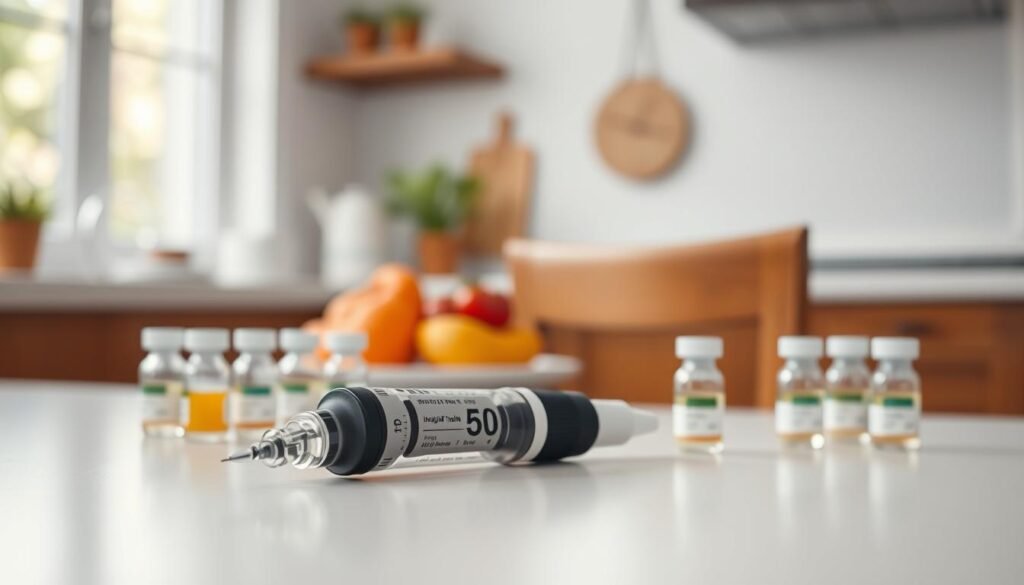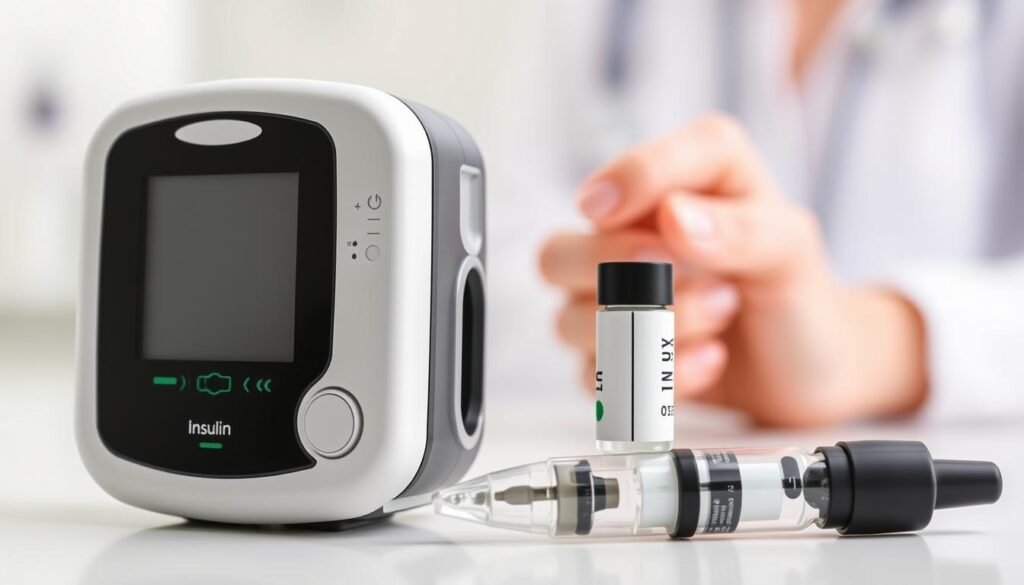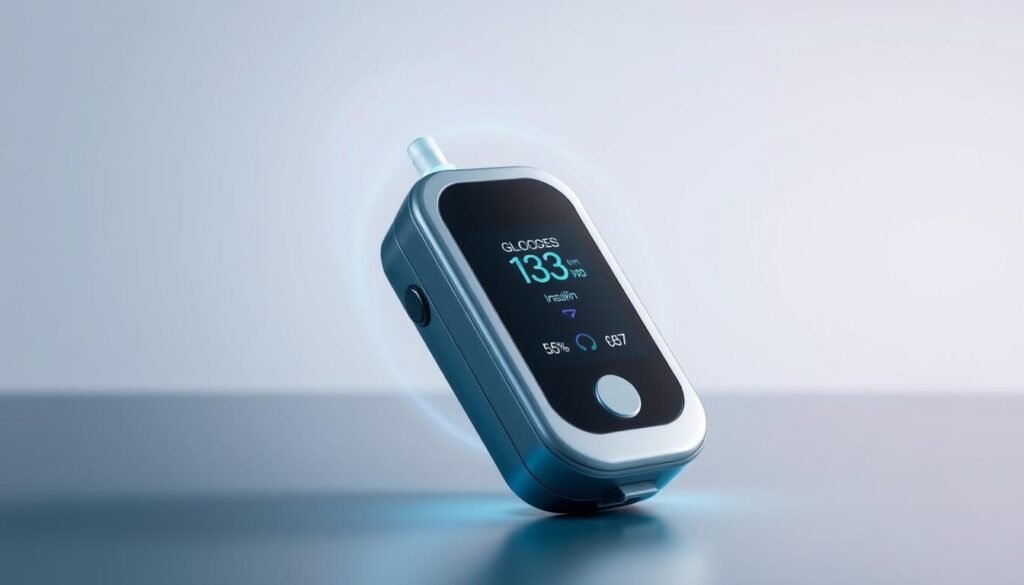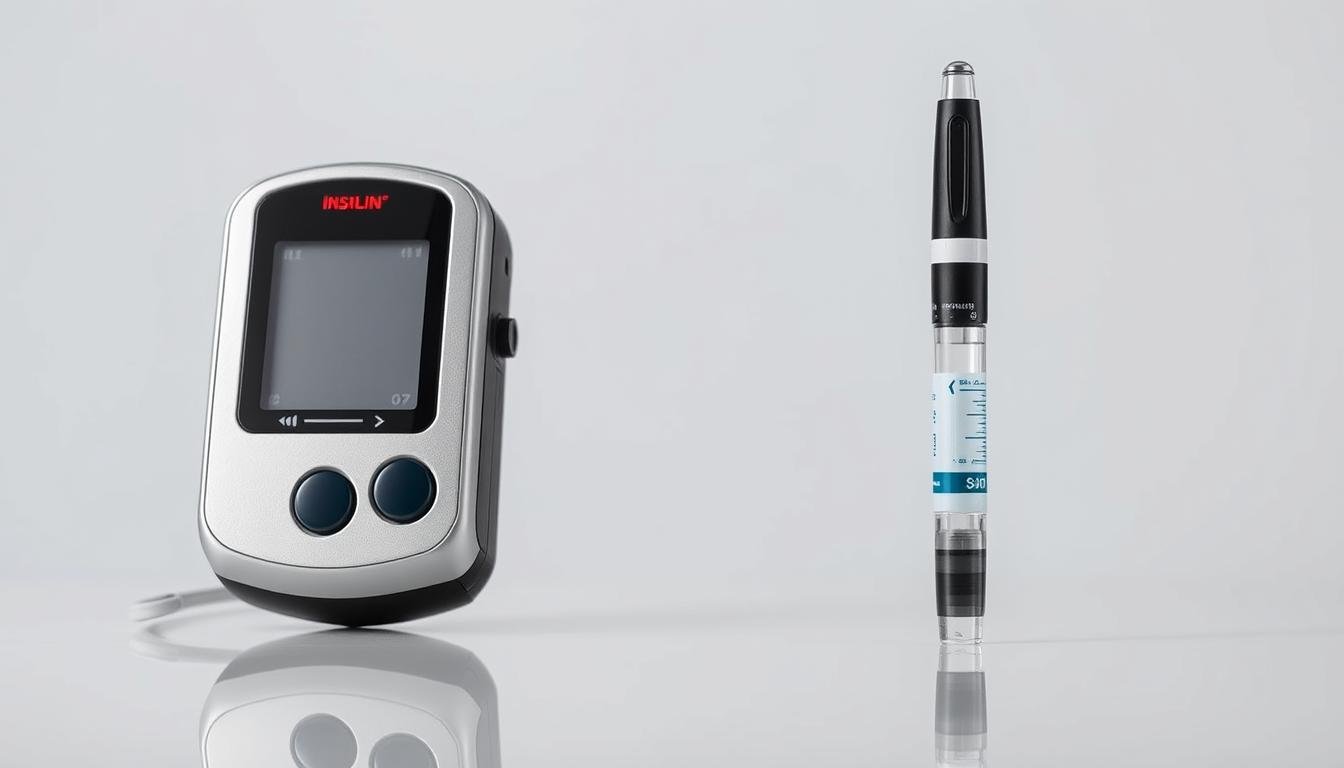Did you know about 34 million Americans have diabetes? They have to choose how to manage it. Choosing between insulin pumps and pens is key for diabetes management. This choice affects their life, ease, and health.
Let’s look at insulin pumps and pens, weighing their pros and cons. It helps to consider ease of use, cost, and upkeep in your decision. If you’re curious about how these systems work, and which fits your needs, start here. For more, check out insulin pens and pumps.
Key Takeaways
- Insulin pumps provide precise dosing and automatic calculations.
- Insulin pens are often simpler to use and more affordable.
- Consulting healthcare professionals is crucial for personalized guidance.
- Cost can be a significant factor in choosing between the two options.
- Understanding individual lifestyle needs can influence the best choice.
Understanding Diabetes Management
Diabetes management is vital for those living with the condition. It keeps blood glucose levels under control. This reduces the risk of serious health problems. Learning about insulin and the types of diabetes is key.
The Role of Insulin in Diabetes
Insulin helps our body use glucose for energy. In Type 1 diabetes, the body can’t make enough insulin. This leads to high blood sugar levels. Type 2 diabetes involves insulin resistance. Here, the body makes insulin but can’t use it well.
Overview of Diabetes Types
It’s important to know about three main diabetes types:
- Type 1 Diabetes: An autoimmune condition leads to very little or no insulin production.
- Type 2 Diabetes: This common type involves insulin resistance, often linked to obesity and inactivity.
- Gestational Diabetes: Happens in pregnancy and may pose a Type 2 risk later.
| Type of Diabetes | Insulin Production | Common Symptoms |
|---|---|---|
| Type 1 | No insulin production | Frequent urination, extreme thirst, weight loss |
| Type 2 | Insulin resistant | Increased hunger, fatigue, blurred vision |
| Gestational | Usually normal | Increased thirst, frequent urination |
What are Insulin Pumps?
Insulin pumps are a big step forward in Diabetes Technology. They provide a way for people with diabetes to manage their insulin easily. These devices offer a steady flow of insulin. This often results in better glucose control than the old way of injecting.
How Insulin Pumps Work
Insulin pumps work by giving insulin through a small device you wear. The main parts of these systems include:
- Reservoirs: They store insulin which the pump uses.
- Insulin Infusion Sets: This is thin tubing that connects the reservoir to a cannula. The cannula goes under the skin to deliver insulin.
- User Interface: It lets users adjust their insulin delivery rate and bolus doses when needed.
Users set the pump to release insulin all day. This helps keep blood sugar levels stable. It lowers the chances of getting high or low sugar levels.
Benefits of Using Insulin Pumps
Insulin pumps have many benefits over old ways of delivering insulin:
- Improved Blood Glucose Management: They deliver insulin constantly. This helps avoid big shifts in blood sugar.
- Convenience: It’s easier for users to change insulin doses. This is handy during meals or workouts.
- Less Frequent Injections: There are fewer needle uses. This means less discomfort.
- Enhanced Flexibility: Users find it easier to plan their meals and activities.
What are Insulin Pens?
Insulin pens are devices made for easy insulin delivery. They’re portable and pre-filled. This means you don’t need separate insulin bottles and syringes. People with diabetes find them very helpful. They let users choose their treatment wisely.
How Insulin Pens Work
Using an insulin pen is straightforward. There are two kinds: disposable and reusable. The disposable ones get thrown away after one use. Reusable pens can be filled again with insulin cartridges. You just set the dose, give yourself an injection, and then throw away the needle safely. This process makes managing diabetes simpler.
Benefits of Using Insulin Pens
The benefits of these pens go beyond just being easy to use. The main advantages are:
- Ease of Use: They allow for quick, easy administration which is crucial for managing diabetes.
- Accuracy in Dosing: They give exact doses, which helps avoid too much or too little insulin.
- Discretion: Their small size and quiet operation mean you can use them anywhere without notice.
In the end, people managing diabetes highly value insulin pens. They fit well with various lifestyles.

Insulin Pumps and Pens: A Comparative Overview
When looking at insulin pumps and pens, we should think about ease of use, costs, and upkeep. Choosing between a pump or pen affects how you manage diabetes every day.
Ease of Use and Convenience
Insulin pumps offer a steady delivery of insulin, making life a bit easier. You can set the pump for daily needs, cutting back on the number of shots needed. But, insulin pens mean more injections, possibly a hassle for those always on the move or with a full schedule.
Cost Considerations
Buying an insulin pump means spending more at the start. You have to think about the pump’s price and the continuous costs for things like insulin cartridges and sets for the pump. Pens are cheaper upfront but need frequent buys of needles and insulin, adding up over time. Insurance coverage is key to making these options more affordable. Check out this research for more about costs and managing diabetes.
Maintenance and Supplies Required
Pumps require ongoing care to work right and provide accurate insulin doses. You’ll need to stay on top of infusion sets and reservoirs. Pens are easier to handle but still need you to keep track of needles and insulin for management.

Continuous Glucose Monitoring Integration
Integrating Continuous Glucose Monitoring (CGM) with modern Insulin Delivery Systems gives a big boost to diabetes management. It provides real-time glucose level data. This teamwork results in more accurate insulin delivery, helping people manage their glucose better.
How CGM Works with Insulin Delivery Systems
Continuous Glucose Monitoring uses sensors under the skin to monitor glucose levels constantly. These measurements are sent to a device or phone, showing glucose changes. When paired with insulin pumps, CGM can even adjust insulin amounts based on the glucose readings. This helps in avoiding too high or too low blood sugar, leading to steadier glucose control.
Advantages of Combining CGM with Pump Therapy
Using CGM with insulin pumps has many benefits. It lets users tweak insulin delivery right away based on glucose data. This combo helps in:
- Improving blood sugar control and reducing the risk of low blood sugar episodes
- Allowing automatic insulin dosing, which simplifies diabetes care
- Lessening the need for frequent checks by users
- Enhancing overall health results by sticking better to care plans

Insulin Delivery Systems: Which is More Effective?
It’s key to know how different insulin delivery systems work for good diabetes care. Each method has its own benefits. These affect how insulin enters the body and its impact on health over time.
Understanding Insulin Delivery Mechanisms
Insulin pumps and pens are common for delivering insulin. Insulin pumps give a constant flow of insulin all day. They let users adjust the dose as needed. This can lead to better blood sugar control.
Insulin pens are simpler, with set doses given throughout the day. Though both help manage diabetes, pumps and pens work differently. Pumps often result in more stable insulin levels. This stability is good for blood sugar management.
Long-term Health Impact Considerations
Managing diabetes well is crucial to avoid serious health issues. Good insulin delivery can lead to better blood sugar levels. This lowers the risk of heart problems, nerve damage, and kidney issues. Using insulin pumps may help with this.
Studies suggest that keeping blood sugar stable with technology aids good health in the long run. For more info on these delivery systems, check this article.
Diabetic Supplies for Insulin Delivery
It’s important to know about the supplies needed for insulin delivery when managing diabetes. Having the right supplies helps people check their blood sugar levels and take insulin properly. This article talks about what is needed for insulin pumps and pens.
What Supplies are Needed for Insulin Pumps?
Insulin pumps need a few key items to work right and keep blood sugar levels steady. These supplies include:
- Insulin Infusion Sets: These are vital for moving insulin from the pump into the body.
- Reservoirs: Insulin is stored here before it’s given out.
- Blood Glucose Meters: They are crucial for making sure the insulin dose is correct by checking blood sugar.
Essential Supplies for Insulin Pens
Insulin pens also need certain things to work best. The important ones are:
- Insulin Cartridges: These hold the insulin and are put into the pen.
- Needles: These are for giving the insulin shot; they come in different sizes.
- Sharps Containers: They are used for throwing away used needles and cartridges safely.
Having the right diabetic supplies makes following an insulin plan easier. This not only makes life more convenient but also helps with better diabetes control. Being prepared supports good health and quality of life.
| Supply Type | Insulin Pumps | Insulin Pens |
|---|---|---|
| Insulin Infusion Sets | Needed for insulin delivery | N/A |
| Reservoirs | Stores insulin | N/A |
| Blood Glucose Meters | Monitors glucose levels | Can also be used with pens |
| Insulin Cartridges | N/A | Contains insulin for injection |
| Needles | N/A | Used for insulin injection |
| Sharps Containers | N/A | For safe disposal of needles |
Personalizing Your Diabetes Technology
Managing diabetes means finding what works best for you. Not everyone will use the same tools in the same way. To get the best results, it’s important to choose technology that fits your life. Things like how active you are, what you eat, and how comfortable you feel with technology matter a lot.
Knowing these details helps you control your diabetes better. This leads to a better quality of life.
Factors to Consider for Your Lifestyle
Everybody lives differently, and technology should match that. If you’re always on the move, an insulin pump might be best. It gives insulin all day without interruption. But, if you’re usually at home, using an insulin pen could be easier.
It’s also key to think about what you like to eat and how you feel about using tech. These factors help you make smart choices for your diabetes care.
Consulting Healthcare Professionals for Advice
Talking to healthcare pros is key in this journey. They give advice that fits you based on your health and how you live. You’ll work together with diabetes educators and other experts.
This helps you create a plan that meets your needs. It lets you manage your diabetes well and take control of your health.


